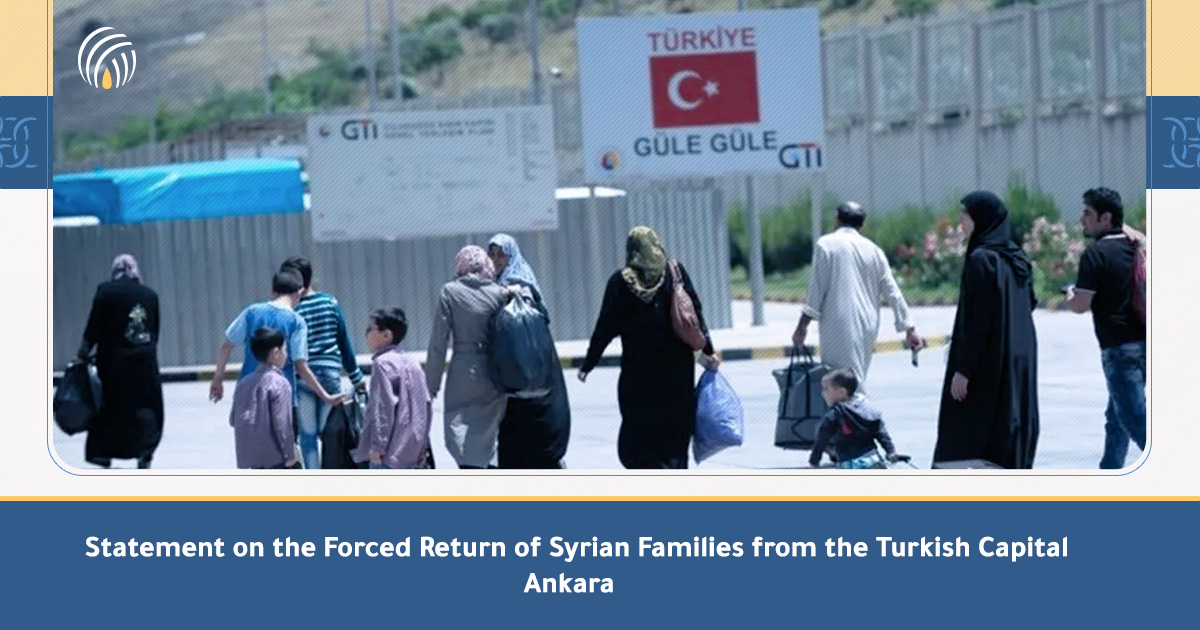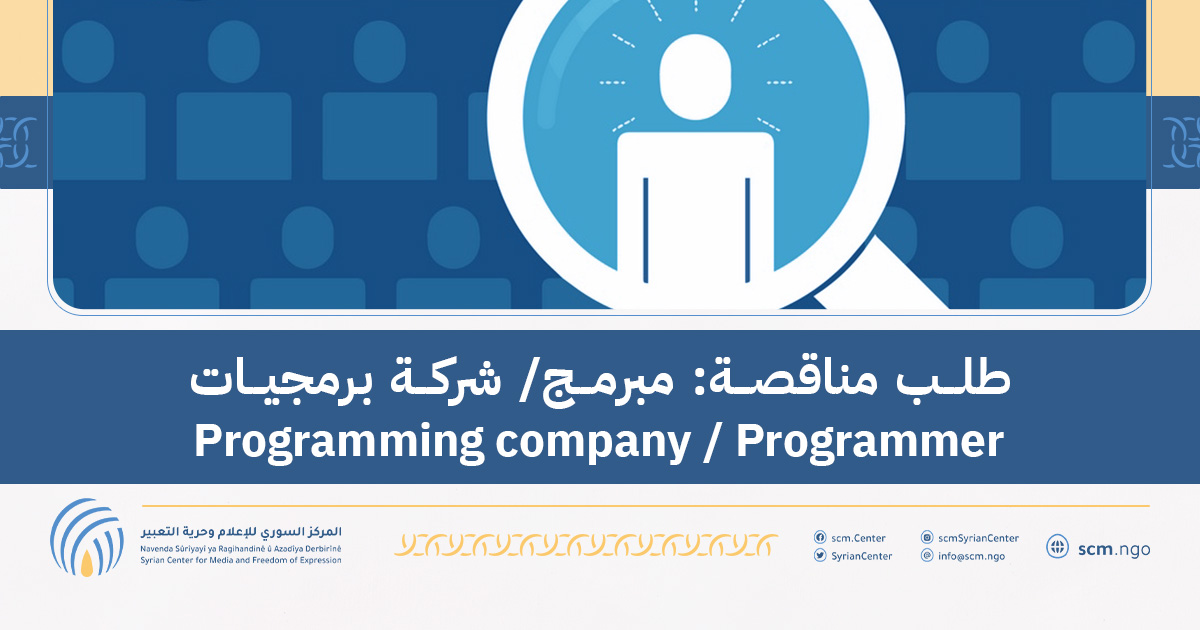Paris (December 28) – On December 6, 2022, at five o’clock in the morning, the Turkish authorities raided the homes of Syrians living in “Kahraman Kazan,” a neighbourhood in the Turkish capital, Ankara, and arrested them. Entire families of Syrians, who were under the temporary protection regime, were taken away to the “Oğuzeli” deportation center in Gaziantep and forced them to fingerprint the voluntary return forms without knowing their content. Those individuals, who were later deported to northern Syria through the “Jarabulus” crossing, confirmed to the Syrian Center for Media and Freedom of Express (SCM) that they are in possession of the temporary protection card “Kimlik” and have not violated any of the laws in the country. The deportation process, which took place within a period not exceeding 72 hours from the moment the homes were raided at dawn, deprived the returnees of the right to object to the deportation decision within the period specified by Turkish law at 15 days, which starts from the date of notification of the deportation decision.
In his testimony to SCM, “A.SH,” one of the forcibly returned persons, confirmed that he was deported with his family, consisting of his wife and four children after they were brought to the police station and told that they were summoned to complete their data and will be able to return home within a few hours. None of the family members were notified of the deportation decision, and they did not have the opportunity to take any of their Syrian identity papers or their personal belongings, such as the house furniture and car that remained at their house in Ankara. After refusing to put his fingerprints on the deportation forms, A.S was threatened and told that his refusal will not change the outcome and that his children will be handed over to the Turkish Social Services Institution (Turkish Social). Such coercion and threats forced him to fingerprint the deportation forms. Another forcible returnee A.S stated that due to his wife pregnancy, his family was able to remain in Turkey; however, their temporary protection cards were confiscated and he was eventually deported to Syria. A.S. was the sole breadwinner for his two kids and wife.
According to M.T.’s testimony, multiple Syrian homes were raided on the 22nd and 23rd of December in the Çubuk district of Ankara and the families were taken to either Akyurt of Oğuzeli deportations centers. The witness’ home was raided on the 22nd of December at 6:30 a.m. in which his wife and four children were arrested. After confiscating his wife’s phone and revoking their temporary protection cards, M.T.’s family along with more than 40 Syrian families were transferred to the Public Security Directorate for three days and were later moved to Oğuzeli Deportation Center in which they remain in till this day.
The continuation and recurrence of deportation cases in more than one Turkish state confirms that they go beyond individual violations or the arbitrary abuse of security services. They indicate a collective deportation policy implemented by the Turkish government against Syrians, which escalated after Turkish President Recep Tayyip Erdogan put forward a project that guarantees the voluntary return of one million Syrian refugees back to their country. The border crossings between the two countries witness continuous movement towards Syria, most of which are cases of forced return. According to the statistics of the Bab al-Hawa crossing, which are published on their official website, the number of deportees from Turkey from the beginning of 2022 until the end of November reached 17,340. As for the other border crossings, there are no accurate statistics on the numbers of forcibly returned persons, just as those in charge of Bab al-Salamah and Bab al-Hawa crossings refused to answer the SCM team’s question about any information related to the forcibly returned people.
These deportation policies are in violation of the Turkish government’s obligations under international law, including international humanitarian law, international human rights law, and its commitment to the principle of non-refoulement, which was recognized by the United Nations Subcommittee on the Promotion and Protection of Human Rights as one of the customary rules, and affirmed by the United Nations General Assembly. It also constitutes a violation of Turkey’s obligations under the International Convention against Torture, the European Convention on Human Rights, the International Covenant on Civil and Political Rights, under the Fourth Geneva Convention and its commitment to the Declaration for the Protection of All Persons from Enforced Disappearance of 1992 in Article /8/ first paragraph, and the International Convention for the Protection of All Persons from Enforced Disappearance article /16/ of all persons from enforced disappearance in 2006. It also violates Security Council Resolution No. /2254/ of 2015 in paragraph /14/, which stipulates that the return of Syrian refugees to their areas of origin must be voluntary and safe.
Such policies also contradict Article /16/ of the Turkish Constitution, which states that “the rights and basic freedoms of foreigners may be restricted under a law consistent with international law” and Article /55/ of Law No. 6458 of 2013, the Law on Foreigners and Temporary Protection in Turkey, which states that the deportation decision shall not be carried out in the following cases: those who have serious indications that they will be subjected to the death penalty or torture or inhuman or degrading treatment or punishment in the country to which they will be deported.
Based on the above, the SCM calls on the Turkish government for/to:
· An immediate and complete cessation of forced returns, arrests, detention and arbitrary deportation of Syrians under the name of voluntary return, or “deportation according to administrative procedures”, and full compliance with Turkey’s international obligations and the Turkish constitution, the law on foreigners and international protection prohibiting refoulement.
· Initiate an urgent investigation into the violations mentioned in the statement regarding forced returns, deportation, expulsion, and coercion against Syrians, and investigate procedures aimed at imposing, deceiving, or falsifying their signature or fingerprints on the “voluntary return” forms and holding the perpetrators accountable.
· Establish better coordination mechanisms, and close cooperation between the Turkish Immigration Department and the Ministry of the Interior, to secure the return of all Syrian deportees to Turkey, for those who hold a temporary protection card, or those who were in their possession and were arbitrarily withdrawn from them, and to find a solution for people who were deported and do not have identification papers in Turkey,
· Withdraw the reservation on the “geographical restrictions” clause in the United Nations Convention on Refugees of 1951, granting Syrians refugee status, approving temporary protection based on the general safety conditions in Syria for those who are not granted asylum for individual reasons, and reinstating the Istanbul Convention against abuse and violence against women home.
· Suspension of the temporary protection regulation issued by Turkish Cabinet Resolution No. 6883 of 10/13/2014, which gives the Turkish authorities the right to deport those who work without obtaining a work permit, which is not granted to the absolute majority of Syrians in Turkey.
· Allow the United Nations High Commissioner for Refugees to send its delegates to deportation centers to supervise the procedures for the return of Syrians and to ensure that they meet the requirements of voluntary return in safety, dignity and with free will that is not marred by any form of coercion, threat or violence.
It calls on the international community and decision-makers to:
· Commit to the requirements of the international response to large-scale refugee crises by providing financial and qualitative assistance in support of refugees and host countries, providing forms of support that contribute to sustainable economic development, and using resettlement in terms of its effectiveness and sustainability as a tool for sharing the burden and responsibility
· Call for an international or regional conference to agree on an emergency plan for support programs for Syrian refugees in neighboring countries to mitigate the effects of the economic crisis experienced by these countries by approving urgent aid, financing development projects that benefit the Syrian refugees and the host community, and finding more efficient control mechanisms for financing and implementation processes Projects in terms of the size of the impact of spending and accountability for achieving results
· Work to ensure a political transition towards building a democratic state in which law prevails in Syria, based on the terms of reference of Geneva and relevant Security Council resolutions, paving the way for the safe and voluntary return of refugees, and emphasizing that any settlement without political change that ignores the causes of the conflict will generate new conflicts and exacerbate instability area, and yield more new migration waves.




